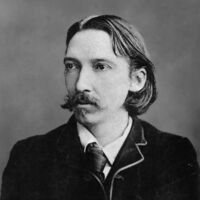The Maker to Posterity
Far `yont amang the years to be
When a’ we think, an’ a’ we see,
An’ a’ we luve, `s been dung ajee
By time’s rouch shouther,
An’ what was richt and wrang for me
Lies mangled throu’ther,
It’s possible - it’s hardly mair -
That some ane, ripin’ after lear -
Some auld professor or young heir,
If still there’s either -
May find an’ read me, an’ be sair
Perplexed, puir brither!
“What tongue does your auld bookie speak?”
He’ll spier; an’ I, his mou to steik:
“No bein’ fit to write in Greek,
I write in Lallan,
Dear to my heart as the peat reek,
Auld as Tantallon.
”Few spak it then, an’ noo there’s nane.
My puir auld sangs lie a’ their lane,
Their sense, that aince was braw an’ plain,
Tint a’thegether,
Like runes upon a standin’ stane
Amang the heather.
“But think not you the brae to speel;
You, tae, maun chow the bitter peel;
For a’ your lear, for a’ your skeel,
Ye’re nane sae lucky;
An’ things are mebbe waur than weel
For you, my buckie.
”The hale concern (baith hens an’ eggs,
Baith books an’ writers, stars an’ clegs)
Noo stachers upon lowsent legs
An’ wears awa’;
The tack o’ mankind, near the dregs,
Rins unco law.
“Your book, that in some braw new tongue,
Ye wrote or prentit, preached or sung,
Will still be just a bairn, an’ young
In fame an’ years,
Whan the hale planet’s guts are dung
About your ears;
”An’ you, sair gruppin’ to a spar
Or whammled wi’ some bleezin’ star,
Cryin’ to ken whaur deil ye are,
Hame, France, or Flanders -
Whang sindry like a railway car
An’ flie in danders."
From Underwoods

